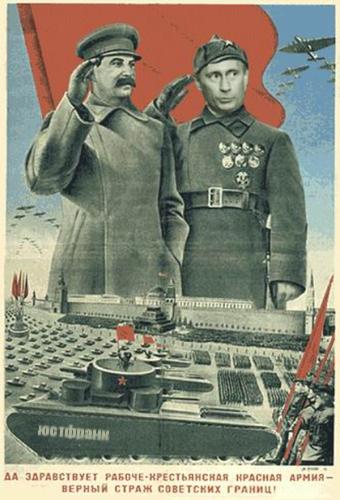Re: The Rise of the Russian Empire: Russo-Armenian Relations
The facts may be disputable, however, the end results of his actions are not. And historically speaking, morals or ethics have never played any role in politics. The bottom line is, Stalin played a pivotal role in Russian history: He thoroughly cleansed the communist movement; through brute force he held together the Russian empire during its worst period; and he successfully rallied the Russian nation against the Nazi invasion.
And at the end of the Second World War the Russian lead Soviet Union was the world's greatest power. Had Stalin not be as brutal as he was he would not have been able to hold on to power and Russia would have simply fallen apart. Regardless of how brutal he was, Stalin will be remembered as one of the greatest figures in Russian history.
In a certain sense the same attributes can be applied to Vladimir Putin. Albeit much less bloody, Putin cleansed the Russian government of its Joo lead oligarchs; he held together the Russian Federation through force; he rallied the Russian nation against NATO and American imperialism.

I am a great admirer of Solzhnicyn, however, referring to his personal experiences during communism is not appropriate for this discussion. Under the peculiar circumstances of the brutal time period in question millions suffered under Stalin. But that is not the point I'm trying to make here. I am simply asking you to look at the big geopolitical picture and the role Stalin played within it.
Anyway, let's leave it at that.
Originally posted by axel
View Post
And at the end of the Second World War the Russian lead Soviet Union was the world's greatest power. Had Stalin not be as brutal as he was he would not have been able to hold on to power and Russia would have simply fallen apart. Regardless of how brutal he was, Stalin will be remembered as one of the greatest figures in Russian history.
In a certain sense the same attributes can be applied to Vladimir Putin. Albeit much less bloody, Putin cleansed the Russian government of its Joo lead oligarchs; he held together the Russian Federation through force; he rallied the Russian nation against NATO and American imperialism.

I am a great admirer of Solzhnicyn, however, referring to his personal experiences during communism is not appropriate for this discussion. Under the peculiar circumstances of the brutal time period in question millions suffered under Stalin. But that is not the point I'm trying to make here. I am simply asking you to look at the big geopolitical picture and the role Stalin played within it.
Anyway, let's leave it at that.







Comment